Bretschger, Lucas. "Getting the Costs of Environmental Protection Right: Why Climate Policy Is Inexpensive in the End". Ecological Economics. Accessed January 16, 2025. https://www.sciencedirect.com/...
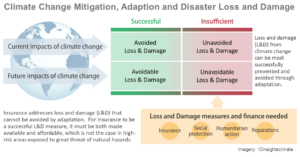
The misconception that stringent climate policies are too costly is widespread among political decision-makers and the public and an often-used argument by governments for sluggish policy making. However, the cost argument ignores the long-term economic benefits of policy changes and is build on the decomposition of environmental impact into separate population, income, and technology effects. This method of decomposing environmental impact calculates costs of climate policy that are far too high. The aggregate economic assessment of climate policies in a holistic economic-ecological system shows economic growth is only initially moderately reduced by a strict climate policy. The cost of climate policy overlooks its long-term benefits, which depend on avoided climate loss and damages.
Posted on 16/01/25
Recent Abstracts
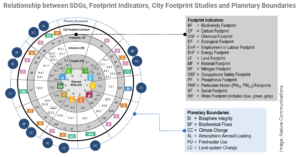
City Footprints and SDGs Provide Untapped Potential for Assessing City Sustainability
Concepts that assess the sustainability of cities are only now emerging. Assessments vary considerably depending upon the indicators, targets and methods. Science can help in defining indicator frameworks, quantifying indicators, and developing the metrics and methods for evaluating progress. The UN 2030 Agenda and ...
Posted on 07/12/21
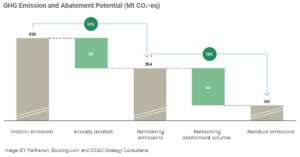
Global Accommodation – The Road to Net Zero Emissions
There is significant potential for the reduction of GHG emissions from accommodations while reducing the operating costs to achieve net-zero GHG emissions by 2050. This report focuses on abating direct and controllable emissions and presents a transition pathway with opportunities for accommodations to directly reduc ...
Posted on 06/12/21
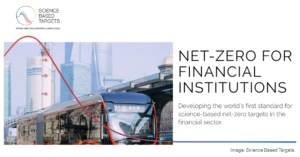
Net-Zero for Financial Institutions
Standardization is needed to evaluate and validate net-zero commitments in the financial sector. This is needed for financial institutions to drive the decarbonization of the real economy and stabilize temperatures at 1.5°C above pre-industrial levels. The objective of the Science Based Targets initiative (SBTi) is t ...
Posted on 06/12/21

Global Destination Sustainability Index 2021
The top 10 destinations are #1 Gothenburg, Sweden; #2 Copenhagen, Denmark; #3 Aarhus, Denmark; #4 Glasgow, UK; #5 Reykjavik, Iceland; #6 Tirol, Austria; #7 Lyon, France; #8 Zurich, Switzerland; #9 Bordeaux, France; and #10 Aalborg, Denmark. The GDS-Index is a performance improvement program to make the leisure tourism ...
Posted on 05/12/21
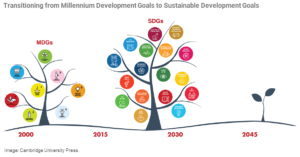
Design For Sustainable Development
This thematic collection aims at creating a forum for encouraging and debating the design for sustainable development. High-quality scientific contributions are needed to provide a coherent and widely accepted approach for designs that maximize the positive and minimize the negative environmental impacts while bringin ...
Posted on 04/12/21

“Overview: Putting Sustainable Development at the Core of Business Models.” In Development Co-Operation Report 2016 – The Sustainable Development Goals as Business Opportunities
The private sector holds a pivotal position in achieving the goals of the 2030 Agenda for sustainable development, which requires funding and co-operation on an unprecedented scale. This chapter addresses how international cooperation can help to put sustainable development at the core of business models and provides ...
Posted on 04/12/21

Does Private Equity Ownership Make Firms Cleaner? The Role Of Environmental Liability Risks
Private equity-backed firms increase pollution in locations and periods where environmental liability risk is relatively low while decreasing GHG emissions and pollution where regulatory risks increase. This study shows that private equity (PE) ownership leads to a 70% reduction in the baseline rate of toxic pollution ...
Posted on 03/12/21

A Net Zero Roadmap for Travel & Tourism
This report supports stakeholders on the transition towards net-zero emissions by providing knowledge for the climate commitments of the private sector. It considers the most common roadblocks and areas for support as well as decarbonization levers for the achievement of net-zero targets. The report offers a decarbon ...
Posted on 02/12/21

Public International Funding of Nature-Based Solutions for Adaptation: A Landscape Assessment
Nature-based solutions for adaptation (NbSA) encompasses different types of activities, investments and approaches that seek to protect and restore nature and ecosystems. NbSA investments are fundamentally important in helping many countries address climate change to bring about economic development and other benefits ...
Posted on 02/12/21

Albrecht Voss: 2021 Hasselblad Masters Winner – Architecture
Albrecht Voss is the winner of Hasselblad Masters 2021 photo competition in the architecture category. The competition consists of 12 categories. Each entry must consist of three (3) photos in each category and each entry is judged on the three submitted images in that category. 60,000 photos were submitted. The Ha ...
Posted on 01/12/21
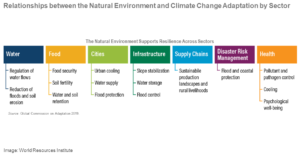
Nature-Based Solutions for Urban Hotel Real Estate
A 40% drop in natural capital per person has been reported over the past two decades while being systematically depleted. However, nature and its ecosystem services are at the center of the hospitality business proposition at the destination, where nature is a source of solutions to mitigate and adapt to climate chang ...
Posted on 01/12/21
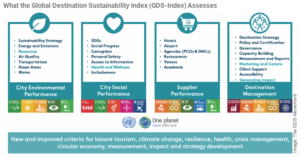
Global Destination Sustainability Index (GDS-Index) Benchmarking Methodology
The GDS-Index is a destination level program that measures, benchmarks and improves the sustainability strategy and performance of tourism and events destinations. Its purpose is to inspire, engage and enable destinations to become more regenerative, flourishing and resilient places to visit, where to meet, and thrive ...
Posted on 30/11/21
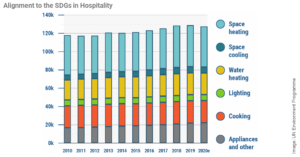
Sustainability in Hospitality
The forum explores ideas, strategies and solution for an industry facing increased environmental and societal challenges. Industry opinion leaders and experts share their thoughts, reactions and insights on the important issues and events that are affecting the global hospitality business. Its goal is to anchor susta ...
Posted on 29/11/21

Pathway to Net Positive Hospitality Raises Global Ambition for the Hospitality Sector
This initiative aims to enable every hotel to improve their impact, wherever they are on the transition towards sustainability. The sustainability framework accessible to the global hospitality industry will encompass four clear stages and practical tools to guide the industry towards a regenerative impact. The hospi ...
Posted on 29/11/21
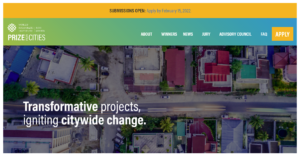
Prize for Cities
Incremental change is not putting communities on track for sustainability, equity and prosperity. Although successful sustainable change is happening, the solutions and successful efforts towards urban transformation are not identified and publicized. To right this, the WRI Ross Center Prize for Cities initiative spo ...
Posted on 28/11/21

